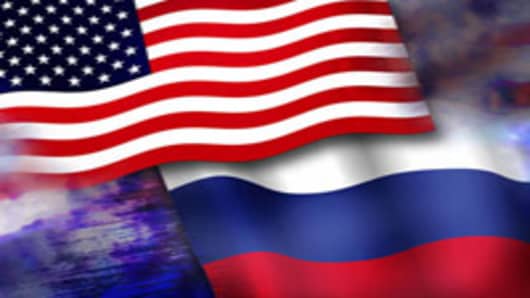Russia Still a Good Long-Term Bet?
Ian Hague, a fund manager with Firebird Asset Management, remains undeterred by recent political tensions and says Russian stocks could be ready to resume their uptrend.
"We're no strangers to political rhetoric that is a bit over the top," he said. "Political rhetoric in Russia has much less of an impact on the actual conduct of business than you might think. It's not really the same kind of relationship that exists between businesses and government as this country."
Hague, who runs $3 billion in various funds and focuses on the former Soviet Union and Eastern Europe, has been investing in Russia for the last 13 years. He says shares of companies such as oil giants Gazprom and Lukoil are now oversold on a technical basis.
"They are the most liquid stocks in the market and they'll benefit from the change in sentiment," he asserts.
Milev of the Metzler/Payden fund contends that stock market declines as a result of negative sentiment have nothing to do with the long-term growth prospects of the Russian economy, which he says remain healthy.
"If you remember the correction of May/June of last year when emerging markets pulled back on concerns of global monetary policy, stocks sold off to an extent that there was absolutely no regard for fundamentals," said the Bulgarian-born analyst. "We were bottom-fishing during that cycle and picked up very healthy returns. I can envision a similar situation in Russia."
Valuations for Russian stocks now appear cheaper than broad Central European and Eastern European indexes, he added.
But Kevin Kerr said he prefers to invest in former Soviet states with a lot of exposure to Russia such as Estonia, Lithuania and Latvia, which are now part of the European Union.
"We would prefer to put our money where we can go to European court," he says. "It's a lot harder to do that in Russia."
More than Just Oil
Those investors brave enough to withstand a potential step-up in volatility may want to look at Market Vectors Russia, a new exchange-traded fund launched April 30.
RSX tracks the newly formed DAX Global Russia Index, a basket of the 30 most actively traded Russian stocks listed locally as well as in London and New York.
Some of the index's components include energy giants Lukoil, Gazprom and Surgutneftgaz, utility giant Unified Energy Systems, steel manufacturer Mechel Steel and mining outfit Norilsk Nickel.
"We believe in the long-term story there," Milev says. "For an investor who's interested in this region and understands the risk-return profile, they just need to take a long-term outlook on the market."
"It's not just the oil story -- oil has been the story for the last three years -- but before that they were already on the path of greater fiscal responsibility, he adds. "Russia is a very different place since 1998."


